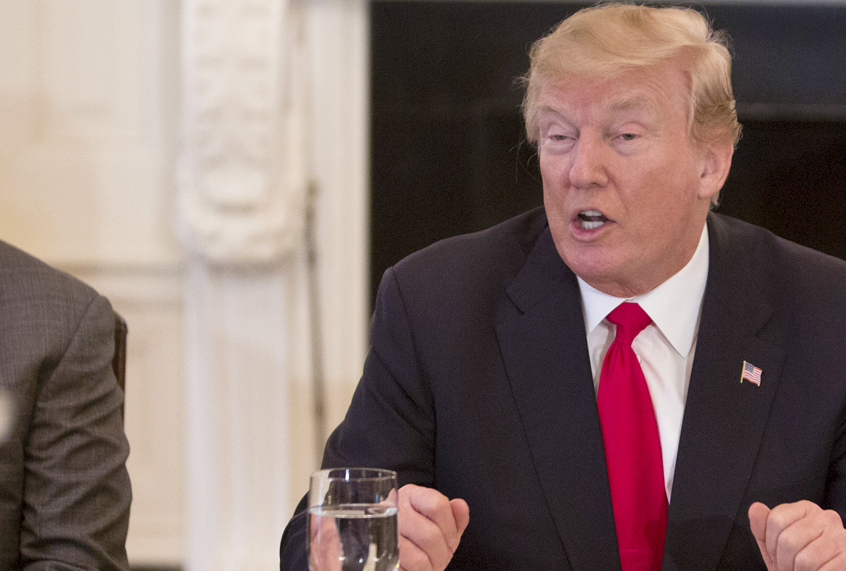Following a wave of recent attacks claimed by the Taliban in Afghanistan, President Donald Trump made it clear that he was not open to any negotiations with the fundamentalist group, despite potential U.S. efforts to engage in future talks.
“We’ll also discuss what more we can do to defeat the Taliban,” Trump said on Monday at an organized luncheon with members of the United Nations Security Council. “I don’t see any talking taking place. I don’t think we’re prepared to talk right now. It’s a whole different fight over there. They’re killing people left and right. Innocent people are being killed left and right.”
He continued, “Killing all over Afghanistan. So we don’t want to talk with the Taliban. There may be a time but it’s going to be in a long time. We’re all out and that’s taking place right now and it’s a whole new front and it’s a whole new set of principles that we’re being governed by.”
Pres. Trump on Taliban, violence in Afghanistan: "It is a whole different fight over there. They are killing people left and right. Innocent people are being killed left and right." https://t.co/qhXaZyNUOa pic.twitter.com/8YETTiQr4n
— CBS News (@CBSNews) January 29, 2018
Trump’s threats to increase fighting on the battlefield come at a time when the Taliban has carried out several recent deadly attacks. On Saturday, an ambulance rigged with explosives was detonated on a busy street in Kabul, killing over 100 civilians an injuring at least 235 more, Reuters reported.
“When we see what they’re doing and the atrocities that they’re committing, and killing their own people, and those people are women and children, many, many women and children that are totally innocent, it is horrible,” Trump said. “So there’s no talking to the Taliban. We don’t want to talk to the Taliban. We’re going to finish what we have to finish. What nobody else has been able to finish, we’re going to be able to do it.”
But Trump’s words seem to undermine previous U.S. strategy, which involved engaging in “reconciliation” talks with the Taliban.
WTF? We just spent two nights in Afghanistan w @CENTCOM’s Gen Votel this weekend where US commander after commander said they were GLAD they had a new S. Asia strategy SPECIFICALLY w the mission goal to pressure the Taliban to reconciliation talks. https://t.co/ukaiJutFxL
— Kevin Baron (@DefenseBaron) January 29, 2018
The Taliban responded to Trump’s comments on Tuesday, citing the ongoing US intervention, and the US’s unwillingness to leave the nation, as justification for acts of terror that have claimed the lives of scores of civilians.
“The true authority of war and peace is not with the Kabul regime, but with the American invaders,” the Taliban’s English-language statement read, according to CBS News.
“Their main strategy is to continue war and occupation,” Zabihullah Mujahid, a Taliban spokesman said in a statement that Reuters reported on. “Donald Trump and his war-mongering supporters must understand that every action has an equal and opposite reaction. If you insist upon war, our mujahideen will not welcome you with roses.”
The resurgence of the Taliban has been forceful, and the shadowy U.S. war that is now old enough to drive has been shrouded in secrecy for years, perhaps more so under the Trump administration. As the country faces a decline in Afghan government control, the Trump administration has sought to escalate American presence there.
NPR elaborated:
The Pentagon continues to withhold facts such as the number of Afghan troops that have died and the number of the Afghan forces that have received training. This information was also not included in the report last quarter from the Special Inspector General for Afghanistan Reconstruction — which was set up by Congress to audit U.S. spending in the country’s longest-running war.
Many military brass believe Trump’s escalations in Afghanistan are of questionable merit, and may only bolster violence in the region. In August, Secretary of State Rex Tillerson admitted that the U.S. may not see a victory on the battlefield, though he also did not think the Taliban would either, as Salon previously reported. “And so at some point we have to come to the negotiating table and find a way to bring this to an end,” Tillerson said at the time.

